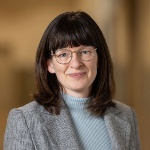Science Minister Petra Olschowski: "The new graduate school takes our QuantumBW innovation campus to the next level and further strengthens Baden-Württemberg as a research and business hub"
The training and further education of specialists and managers is a central focus of Baden-Württemberg's quantum strategy. The state is therefore providing 4.7 million euros to establish a graduate school in the emerging field of quantum technology. In particular, the new graduate school will strengthen the Quantum BW innovation campus and promote exchange between the state universities and industrial partners. It is managed by the Center for Integrated Quantum Science and Technology (IQST), an interdisciplinary research platform for quantum technologies in which the University of Stuttgart has a leading role.
"Quantum technology has unimaginable potential - from high-performance quantum computers and ultra-sensitive sensors to navigation in space. In order to make the transition from theory to practice, we need highly trained specialists from science and industry. The new graduate school with ten doctoral positions takes our QuantumBW innovation campus to the next level and further strengthens Baden-Württemberg as a research and business hub," said Science Minister Petra Olschowski on July 10 in Stuttgart.
Transfer from science to application
The Ministry of Science is funding ten doctoral positions at the IQST-Graduate School @QuantumBW for an initial period of four years. Graduate schools facilitate structured doctoral programs, often including additional seminars and supervision. The new facility is not limited to one specific location, but is open to young researchers from all universities in Baden-Württemberg. Each doctoral project is led by a research institution and accompanied by at least one industrial partner. This model promotes both the transition from scientific research to practical applications and strengthens the collaboration between industry and university research.
"Within the graduate school, we support projects that bridge the gap between basic research and technology development. These are projects that have high technological potential, but which are still at an early stage of development. This is how we forge a link to practical applications," says Stefanie Barz. A professor at the Institute for Functional Matter and Quantum Technologies at the University of Stuttgart, she heads IQST together with Prof. Dr. Fedor Jelezko from Ulm University. Barz is also coordinator of the new IQST-Graduate School @QuantumBW.
At IQST, researchers from Stuttgart and Ulm, along with partners from across Baden Württemberg, have been leveraging their expertise in both fundamental and applied research in the field of quantum technology for many years. A particular focus of IQST is the training of doctoral students. The new graduate school brings these established structures together with the QuantumBW innovation campus.
The main research areas to be addressed within the IQST-Graduate School @QuantumBW are:
- Quantum sensor technology and metrology
- Quantum computing and quantum informatics
- Integrated quantum technologies, integrated quantum photonics and quantum materials
- Quantum networks
In addition, training and additional qualifications are offered on topics including technology transfer, entrepreneurship, and intellectual property (IP). These training courses are also open to doctoral students from other quantum initiatives across the state. In this way, the doctoral network and the quantum community in Baden-Württemberg will continue to grow. The call for tenders will be published in July 2024 so that the ten doctoral projects can start in October 2024.
QuantumBW
With the support of the Baden-Württemberg Ministry of Science and the Ministry of Economic Affairs, global players from industry joined forces with universities and research institutions to form the QuantumBW innovation campus in April 2023. QuantumBW thus builds on an existing and successful network of science and industry. With QuantumBW, the state is establishing a comprehensive umbrella brand that strengthens existing networks and amplifies their international visibility. The state is initially providing around 32 million euros for the period 2023 to 2027 to set up QuantumBW and bundle existing expertise. This will enable important structural and networking measures to be initiated in the short to medium term in the quantum community in Baden-Württemberg. The strategic goals and fields of action of QuantumBW are published and summarized in Baden-Württemberg's quantum strategy. The QuantumBW office serves as a central contact point, strategically networking and coordinating important stakeholders and locations.
Further information: www.quantumbw.de
Center for Integrated Quantum Science and Technology (IQST)
Since its foundation in 2014, the Center for Integrated Quantum Science and Technology (IQST) has established itself as one of the leading research institutions in the field of quantum technology, with the support and financial backing of the Carl Zeiss Foundation, the Universities of Stuttgart and Ulm and the Baden-Württemberg Ministry of Science.
Originally founded as a joint center of the Universities of Stuttgart and Ulm as well as the Max Planck Institute for Solid State Research in Stuttgart, IQST now brings together interdisciplinary researchers from all over Baden-Württemberg. They collaborate, pooling their expertise and, together with other partners in the region, translating findings from basic research into practical applications. Potential applications range from quantum computing and quantum sensor technology to quantum communication. The University of Stuttgart focuses on cooperation between physics, engineering, and computer science, whereas in Ulm, the focus lies on quantum bioscience and applications such as quantum sensors for medical purposes. Collaborations with partners from industry form the basis for the transfer of research results into technical applications. An essential component of IQST is the support and development of young talent.
| Contact | Prof. Dr. Stefanie Barz, email: barz@fmq.uni-stuttgart.de, phone: 0711 685 61556 |
|---|
Contact

Lena Jauernig
Editor Research / Early Career Researchers


